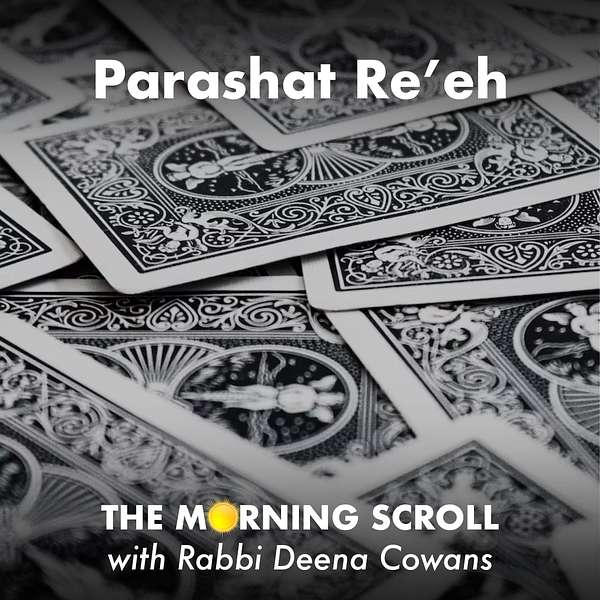
The Morning Scroll
The Morning Scroll
Parashat Re'eh, August 25th
Use Left/Right to seek, Home/End to jump to start or end. Hold shift to jump forward or backward.
"...Anyone who says they are a prophet with further instructions from God is to be treated as a liar and put to death, no matter how many tricks they perform." Magicians — you're on notice.
Produced by Mishkan Chicago. Music composed, produced, and performed by Kalman Strauss. See our upcoming Shabbat services and programs here, and follow us on Instagram and like us on Facebook for more updates. Check out Shabbat Replay on Contact Chai for more from Rabbi Deena.
Welcome to The Morning Scroll! I'm Rabbi Deena Cowans from Mishkan Chicago and you're listening to what will be a quick dive into this week's parsha. If you’ve been meaning to brush up on your Jewish literacy, or you’re looking for some inspiration, you’ve come to the right place. This week, we read Parashat Re’eh, see, a call to attention. We’ll start with a brief recap:
See, Moshe tells the Israelites, God has placed before you blessings and curses, so do what God wants and get the blessings. He then divides the nation in half and sends one half to Mount Gerizim to proclaim the blessings, and one half to Mount Ebal to proclaim the curses. He reminds them to destroy all idols in the land once they get there, and says one day God will pick a specific location to live in permanently, and will have the Israelites build a permanent temple there. Then, the people won’t be allowed to sacrifice anywhere else, but they can continue to kill cows for eating, as long as they don’t eat the blood. Moshe YET AGAIN tells the people not to be tempted by the religious practices of the Canaanites, but to stick to the Torah and don’t add or subtract anything from it. Anyone who says they are a prophet with further instructions from God is to be treated as a liar and put to death, no matter how many tricks they perform. He then outlines some punishments for idolatry, tells the people not to engage in body-modification such as cutting or tattooing, and reminds them of which animals are kosher, which ones aren’t and how to tell the difference between them. We then get a repeat of laws of tithing, including a provision that it can only be eaten in Jerusalem, but also a loophole where someone who lives too far from Jerusalem to travel there with a bunch of food in tow can exchange it for money and buy new food in Jerusalem. Moshe then repeats the laws of the Shmita year, letting the land be fallow every 7th year and forgiving loans. He also tells the people to give to the poor with a happy heart and generously, even if it’s close to a shmita year, and reminds them to let slaves go after 6 years, providing them with a parting severance gift. Finally, we learn more laws of the pilgrimage festivals of Passover, Shavuot and Sukkot, and are reminded that all the people should gather in the Temple for these holidays.
The first line of this parsha, “Re’eh anochi noten lifneicham hayom b’racha u’klalah”, See, I am putting before y’all today blessing and curse, is one of those Torah lines that gets quoted often. It is a reminder of how powerful we are, that we have the ability to choose how life pans out for us. The thing is, this is pretty hard to do in practice. We don’t always see immediate consequences for our actions, and sometimes what we thought would be a really big problem turns out to be no big deal. Which, when it comes to exercising free will, sometimes makes it hard for us to make the quote unquote “right” decision when it’s also the harder decision.
The Kli Yakar, a 17th century rabbi from Prague, notices this problem too, and he sees a solution in the words of the verse themselves. Re’eh, “See” is singular, he notes, while “lifneichem” “Before you” is plural. He then quotes a rabbinic teaching, saying, “A person must always view things as if the entire world is half righteous and half wicked. If she performs a single mitzvah she tips herself and the entire world to the side of merit. Therefore Moshe spoke to every individual, “See” that he should see in his thought that every single action affects all of them.”
What the Kli Yakar has done here is up the ante. Your particular, individual actions matter to the whole community, he’s saying, and you could be the very person to tip the balance. It reminds me of how we welcome Elijah the prophet, said to be the bearer of news of the Messiah, at every baby naming, because we recognize the potential each new baby brings to change the world. Each of us WILL change the world in some way, the question is just whether we will tip it towards more blessing, or not.
So this week, I want to offer a blessing to the individual Israelites who heard this and thought to themselves, “Oh boy, time to tighten up”. Sometimes we do just need a little kick in the tuchus to start to move towards behaviors and choices that we wanted to make anyway. And to each of you, this is the season of “little kick in the tuchus to examine your actions”, and I hope you will be blessed to recognize how important you and your actions are.